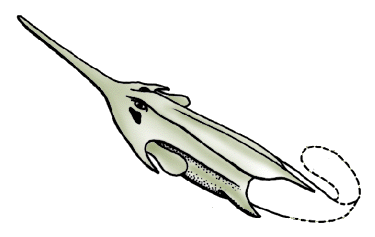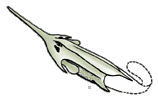Pituriaspida
Philippe Janvier
- Pituriaspis

- Neeyambaspis

Introduction
The Pituriaspida are a small group of fossil, armored jawless vertebrates, only known by two genera, Pituriaspis and Neeyambaspis, from the late Early Devonian or early Middle Devonian (about 390 million years) of Queensland, Australia. The best documented form, however, is only Pituriaspis, which resembles the Osteostraci, although devoid of any median dorsal nasohypophysial opening. The nasal or nasohypophysial opening is supposed to lie ventrally, anteriorly to the mouth. The headshield of Pituriaspis shows a ventral oralobranchial chamber, as in the Osteostraci and Galeaspida, a long anterior rostral process, and two lateral cornual processes which bound anteriorly the area for the attachment of the paired fins. The headshield extends posteriorly to form a long abdominal division which probably reached the anal region.
Pituriaspids lived in a marine, deltaic environment, along with various placoderms.
Characteristics
The only unique characteristic of the Pituriaspida is a peculiar pit, of unknown function, ventrally to the orbits.References
Janvier, P. (1996). Early vertebrates. Oxford Monographs in Geology and Geophysics, 33, Oxford University Press, Oxford.
Young, G. C. (1991). The first armoured agnathan vertebrates from the Devonian of Australia. In Early vertebrates and related problems of evolutionary biology (ed. M. M.Chang, Y. H. Liu, and G. R. Zhang), pp. 67-85. Science Press, Beijing.
Title Illustrations

| Location | Australia |
|---|---|
| Comments | Pituriaspids are mainly known by Pituriaspis, from the Devonian of Australia. As a whole, their headshield is quite similar to that of osteostracans, though devoid of a naso-hypophysial opening. The mouth, gill openings and presumably the nasal aperture were all situated on the ventral side of the head. Well-developed paired fins attached on either sides of the headshield. The only diagnostic feature of pituriaspids is an enigmatic pit adjacent to the eyes. |
| Reference | based on Young, G. C. (1991). The first armoured agnathan vertebrates from the Devonian of Australia. In Early vertebrates and related problems of evolutionary biology (ed. M. M. Chang, Y. H. Liu, and G. R. Zhang), pp. 67-85. Science Press, Beijing. |
| Specimen Condition | Fossil -- Period: Devonian |
| Image Use |
 This media file is licensed under the Creative Commons Attribution License - Version 3.0. This media file is licensed under the Creative Commons Attribution License - Version 3.0.
|
| Copyright |
© 1997
Philippe Janvier

|
About This Page
Philippe Janvier

Muséum National d'Histoire Naturelle Paris, France
Page copyright © 1997 Philippe Janvier
 Page: Tree of Life
Pituriaspida.
Authored by
Philippe Janvier.
The TEXT of this page is licensed under the
Creative Commons Attribution License - Version 3.0. Note that images and other media
featured on this page are each governed by their own license, and they may or may not be available
for reuse. Click on an image or a media link to access the media data window, which provides the
relevant licensing information. For the general terms and conditions of ToL material reuse and
redistribution, please see the Tree of Life Copyright
Policies.
Page: Tree of Life
Pituriaspida.
Authored by
Philippe Janvier.
The TEXT of this page is licensed under the
Creative Commons Attribution License - Version 3.0. Note that images and other media
featured on this page are each governed by their own license, and they may or may not be available
for reuse. Click on an image or a media link to access the media data window, which provides the
relevant licensing information. For the general terms and conditions of ToL material reuse and
redistribution, please see the Tree of Life Copyright
Policies.
Citing this page:
Janvier, Philippe. 1997. Pituriaspida. Version 01 January 1997 (under construction). http://tolweb.org/Pituriaspida/14841/1997.01.01 in The Tree of Life Web Project, http://tolweb.org/








 Go to quick links
Go to quick search
Go to navigation for this section of the ToL site
Go to detailed links for the ToL site
Go to quick links
Go to quick search
Go to navigation for this section of the ToL site
Go to detailed links for the ToL site